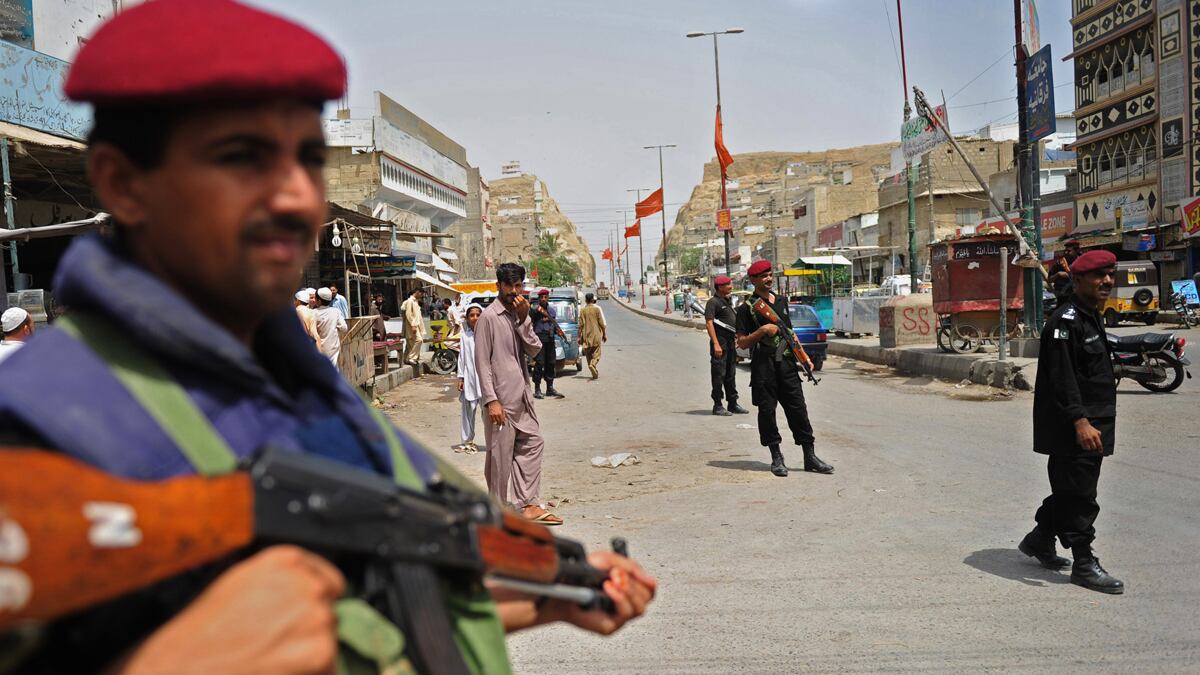Already frayed to a near-breaking point, the U.S. – Pakistani relationship this week came under additional strain with reports that Pakistan had arrested several people who had allegedly provided the CIA with information in connection with the raid on Osama bin Laden’s hideout.

Now comes report of “seething anger” among Pakistan’s military rank and file aimed at Pakistan’s army chief, who is seen to be too close to the U.S.
Clearly, the security-based relationship between the U.S. and Pakistan is unraveling rapidly – at a critical time. With America poised to begin withdrawal from Afghanistan next month, the U.S. needs Pakistan’s support in backing a political settlement between Taliban leaders and the Afghan government in Kabul. And then there is the question of militants still hiding in the country. Al Qaeda’s new major-domo – Ayman al-Zawahiri – is believed to be hiding somewhere in the hinterlands along the Afghanistan-Pakistan border.
But Pakistan’s military, which oversees the country’s security and foreign policy, has dug in its heels under public and internal pressure. It looks set to impede the U.S. military action against militant groups and hideouts inside Pakistan that is necessary for the Obama administration’s plans to start drawing down from Afghanistan.
On his visit to Islamabad last week, CIA chief Leon Panetta reportedly confronted the Army chief, Gen. Ashfaq Kayani, with evidence of Pakistan’s tipping off militant targets, specifically explosives experts who are part of the suicide-bombing factory line. Panetta is also said to have expressed concern for the safety of the five CIA informants, including a Pakistan Army major, who may have provided information on Osama bin Laden’s whereabouts. It is believed that these men have been detained by the military for questioning, and possible court-martial. In a terse press statement on Wednesday, the military denied any officers had been arrested.
Except that such rote denials are finding few takers, especially in Pakistan, where the old customary deference accorded to the military is gone, and its rank-and-file tensions are now out in the open. The issue of divided allegiances is not new. What is alarming is that they seem to run deeper than previously acknowledged. Husain Haqqani, author of Between Mosque and Military and currently Pakistan’s ambassador in Washington, points to the past for an explanation of the present challenge. “The years of jihad in Afghanistan [in the 1980s] and Kashmir [in the 1990s] have confused our officers and people,” he told The Daily Beast. “For many, ideology determines the worldview instead of the strategic reality.”
The reported, and since denied, arrests of CIA informants within the Army do not necessarily show diversity among the divided. Given the $50 million bounty on bin Laden’s head, it is unlikely that the alleged informants were operating out of ideological purity. This likelihood only raises more concerns about the integrity of commissioned personnel, including those tasked to safeguard the country’s growing nuclear arsenal. (Pakistani government and military officials insist security at the nuclear facilities is adequate.)
The military’s latest denial is an attempt to muzzle further discussion of its internal tensions. In the past, serving and retired personnel were hauled up after the 2003 assassination attempts on then President Pervez Musharraf, who tried to purge Islamist sympathizers from the ranks. When I met Musharraf four years later, he expressed alarm over the 200-odd soldiers who had surrendered to Taliban leader Baitullah Mehsud without firing a shot, and the refusal of Cobra helicopter pilots to take targets in the tribal areas. Scores of quiet court-martials followed.
Similar arrests were also made days before and after the May 22 attack at the Mehran navy base in Karachi. Journalist Saleem Shahzad, whose last report for Asia Times Online suggested Al Qaeda may have infiltrated Navy ranks, was found dead on May 31. The Inter-Services Intelligence directorate is widely held to have been involved in his killing. In a rare press release that followed, the spy agency warned news organizations not to “deliberately malign the [ISI] in the eyes of the people.” The military needs no help there. Last week, paramilitary troops shot and killed an unarmed man in Karachi. Footage of the killing has gone viral and further inflamed public sentiment against the generals.
Abbottabad, the escalation in drone strikes, subsequent intelligence failures and perceived excesses have been game changers for the military. After the government gave him an unprecedented full-term extension last year after consulting Washington, General Kayani, once trumpeted as a professional solider—an image he studiously cultivated—is now derided as someone who cuts deals with venal politicians and America. His meet-and-greets at mess halls across Pakistan have not been feel-good affairs. Now, with journalists and politicians having declared open season on the military, the institution may be taking refuge in anti-Americanism, ramping it up in the hope that this will help close ranks and rally support from an exhausted public.
Over the past few months, the military is believed to have disclosed the tightly guarded identities of two successive CIA station chiefs in Pakistan; encouraged a local lawsuit against the U.S. secretary of defense; leaked news about the CIA status of Raymond Davis, who shot and killed two Pakistanis in January; given the state of war, gone out of their way to demand the arrests of American citizens who may have overstayed their visas; and planted stories about ISI chief Gen. Shuja Pasha scolding the CIA’s Panetta in Washington. It has complained publicly about drone strikes in an odd act of self-emasculation, and U.S. military and economic assistance in what comes across as ingratitude. The military has also, according to a June 9 press release, “drastically cut down the strength of U.S. troops stationed in Pakistan.”
Smarting from the string of recent disasters and withering scrutiny at home and abroad, the military has lapsed into the resentments of the early 1990s, when the U.S. cut Pakistan loose after a decade of working the Afghan jihad together. Given the antipathy toward the U.S. and sympathies for the militants among the troops, the Army brass finds itself hard placed to challenge the terrorists it had once unscientifically divided into “good” and “bad,” who attack soldiers and civilians alike. If they go after the militants, they risk losing the ranks. If they let the U.S. do their job for them, they risk losing their raison d’être.






